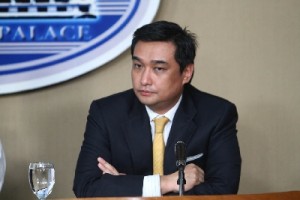Palace releases excerpts of Senate deliberations on anti-cybercrime law
MANILA, Philippines – Amid the uproar over the implementation of the anti-cybercrime law, Malacañang on Wednesday released excerpts of Senate deliberations on the controversial measure “to provide greater context to the discussions.”
The excerpts of deliberation showed discussions on the measure from the time it was sponsored on the floor on May 11, 2011 up to the time it was approved on third and final reading on January 30, 2012 as well as the Senate’s approval of the bicameral conference committee on June 5, 2012.
“For the Record: Public records of Senate Deliberations on the Cybercrime Prevention Bill,” read the Twitter post of the government’s Official Gazzette.
Asked to confirm the release of the documents and the reason behind it, Communications Secretary Ricky Carandang said: “To provide greater context to the discussions about the cybercrime law.”
The excerpts showed that on December 12, 2011 deliberations on the floor, Senate Majority Leader Vicente “Tito” Sotto III inquired from Senator Edgardo Angara if the proposed measure would also address Internet libel or Internet defamation.
It was Angara, chairman of the Senate committee on science and technology, who sponsored the measure on the floor.
Responding to Sotto’s query, Angara said “the bill includes it as a crime, an actionable offense, because one can be defamed through Twitter or social media.”
“Referring to the case of actress Rhian Ramos, who claimed that someone maliciously distributed information about her through the YouTube, Senator Angara believed that it is an actionable offense under the bill and the PNP and NBI would monitor and investigate it,” the excerpts showed.
In the January 24, 2012 deliberations, the excerpts showed that Sotto further pushed for the inclusion of libel as among the punishable offenses of the law.
“Preliminarily, Senator Sotto stated that there are numerous abuses in technology, particularly the video and photo uploading and unnecessary write-ups and comments in social networking systems…” it said.
“Senator Sotto observed that the publication requirement in the crime of libel can be achieved by the mere fact that it is seen in cyber-space and this can further promote the habit of “think before you click. It is clear, he noted, that cybercrimes are not covered under Article 355 of Revised Penal Code,” the documents added.
Sotto in various media interviews admitted that he initiated the libel provision in the law.
Thirteen senators voted in favor of the law while only one, Senator Teofisto Guingona III, voted against it.
Those who voted were: Sotto, Senate Pro Tempore Jose Jinggoy Estrada, Senators Francis “Chiz” Escudero, Gregorio Honasan, Pia Cayetano, Panfilo “Ping” Lacson, Lito Lapid, Loren Legarda, Ferdinand “Bong-Bong” Marcos Jr., Aquilino “Koko” Pimentel III, Ralph Recto, Ramon “Bong” Revilla Jr., and Manuel Villar.
President Benigno Aquino III signed the measure into law last month.
